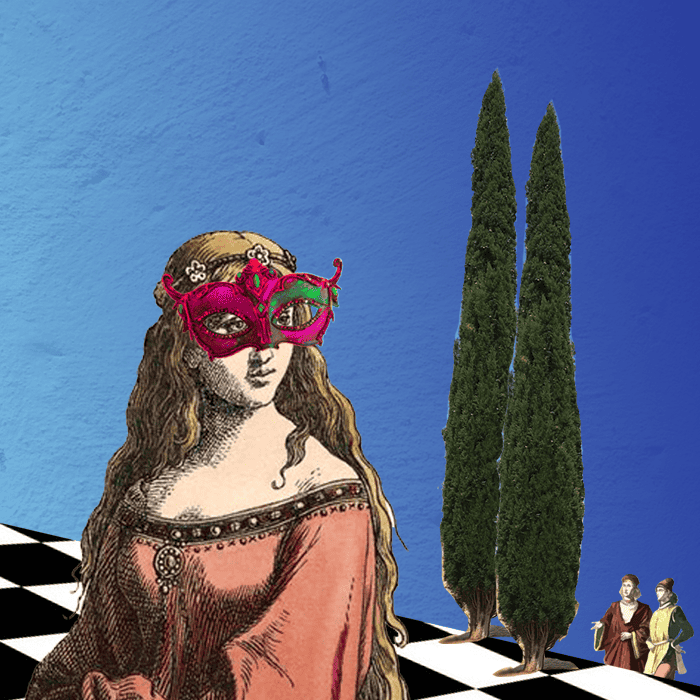Exploring the evidence that the works of Shakespeare were written by Edward de Vere, 17th Earl of Oxford
Exploring the evidence that the works of Shakespeare were written by Edward de Vere, 17th Earl of Oxford
The Shakespeare Plays / Much Ado About Nothing
Love/hate never felt so good as in this glorious rom-com from Shakespeare, Much Ado About Nothing, where a rocky story of Claudio and Hero’s new, young, inarticulate, and fragile love takes a backseat to Benedick and Beatrice’s rapid-fire exchange of hostile wit and obvious repression of ongoing mutual fascination. Their backstory remains a mystery, but in this playful play full of deceits, the two must confess, to themselves and to each other, their love. First, though, they must clear up the mess made by the villain concerning that other couple: what were their names? Happily, all’s well that ends well. (Hey! That gives me an idea….)
A few of the questions we seek to illuminate:
What does the phrase Much Ado About Nothing mean? What is this “Nothing”?

Did Beatrice and Benedick meet previously in another Shakespeare play?
What’s the relationship between constable Dogberry’s malapropisms and ravings and the Howard-Arundel Libels of 1580?
Professor Michael Delahoyde walks us through Much Ado, act by act!
Much Ado About Nothing is one of Shakespeare’s finest comedic plays. Set in Messina, it revolves around the intertwining stories of two couples: Beatrice and Benedick, and Hero and Claudio.
The plot kicks off with the return of soldiers Don Pedro, Claudio, and Benedick from war. Claudio decides he’s in love with Hero, the daughter of Leonato, the governor of Messina. Meanwhile, Benedick engages in a war of wits with Beatrice, Hero’s cousin, both adamantly professing their disdain for love and marriage.
The villain Don John, Don Pedro’s illegitimate brother, plots to ruin Claudio and Hero’s impending marriage with the aid of his two henchmen. His first attempt fails.
Don Pedro, Claudio, and Leonato conspire to make Beatrice and Benedick fall in love with each other by tricking them into overhearing conversations praising their supposed affections and condemning their insensitivities.
Due to Don John’s next deceptions, Claudio wrongly accuses Hero of infidelity on their wedding day, publicly humiliating her. However, with the help of a bumbling constable named Dogberry, the truth is eventually revealed, and Hero’s innocence is proven.
In the end, Claudio is reunited with Hero, while Beatrice and Benedick finally confess their love for each other. The play concludes with a joyful celebration marking the resolution of misunderstandings and the triumph of love over deception.
Much Ado About Nothing can be dated between 1583, when all the major sources were available, and 1600, when it was published.
What works inspired the author of Much Ado?
Michael Delahoyde, Much Ado About Nothing, Overview and Act by Act.
Visit the website of Professor Michael Delahoyde, host of our series, for an act by act analysis and full treatment of Oxfordian themes in the play.
Percy Allen, “Much Ado About Nothing — A Burlesque of the Oxford-Howard-Arundel Quarrel.” April Shakespeare Fellowship News-letter April 1950: 4-5. [Repr. in Clark, Hidden Allusions, 3rd ed., Ed. Ruth Loyd Miller. 1974. 549-551.]
Richard Desper, “Much Ado About Oxford, Part 1.” Shakespeare Oxford Newsletter 42.3 (Fall 2006): 3-4, 21.
Richard Desper, “Much Ado About Oxford, Part 2.” Shakespeare Oxford Newsletter 42.4 (Fall 2006): 16-20. [Parts 1 & 2 reprinted in Altrocchi, Building the Case for Edward de Vere as Shakespeare.]
Anne Dobbs, Film Review. “Much Ado About Something Explores Marlowe’s Case.” Shakespeare Oxford Newsletter 38.1 (Winter 2002): 20.
Nore Fiore, “Hamlet and Much Ado About Nothing: The Keys to Shakespeare.” Shakespeare Matters 8.3 (Summer 2009): 21-24.
Admiral Hubert H. Holland, “Much Ado About Nothing and The Shepherd’s Calendar.” Shakespeare Fellowship News-letter (1947): 6-8.
Philip Johnson, “Much Ado About Nothing. In Gilvary, Dating Shakespeare’s Plays.” (2010): 91-100. Dating Shakespeare’s Plays.
Earl Showerman, “Shakespeare’s Many Much Ado’s: Alcestis, Hercules, and Love’s Labour’s Wonne.” Brief Chronicles 1 (2009): 109-140.
BOOK
William Farina, De Vere as Shakespeare: An Oxfordian Reading of the Canon. Jefferson, NC: McFarland and Co., 2006. 44-48.
Sign up to our free email news mailing list to get invitations to attend Shakespeare Illuminated live!
The Much Ado About Nothing episode of Shakespeare Illuminated was sponsored by a generous donation from Judy Davis.
To support Shakespeare Illuminated, please contact us at info@shakespeareoxfordfellowship.org.
| Cookie | Duration | Description |
|---|---|---|
| cookielawinfo-checkbox-analytics | 11 months | This cookie is set by GDPR Cookie Consent plugin. The cookie is used to store the user consent for the cookies in the category "Analytics". |
| cookielawinfo-checkbox-functional | 11 months | The cookie is set by GDPR cookie consent to record the user consent for the cookies in the category "Functional". |
| cookielawinfo-checkbox-necessary | 11 months | This cookie is set by GDPR Cookie Consent plugin. The cookies is used to store the user consent for the cookies in the category "Necessary". |
| cookielawinfo-checkbox-others | 11 months | This cookie is set by GDPR Cookie Consent plugin. The cookie is used to store the user consent for the cookies in the category "Other. |
| cookielawinfo-checkbox-performance | 11 months | This cookie is set by GDPR Cookie Consent plugin. The cookie is used to store the user consent for the cookies in the category "Performance". |
| viewed_cookie_policy | 11 months | The cookie is set by the GDPR Cookie Consent plugin and is used to store whether or not user has consented to the use of cookies. It does not store any personal data. |